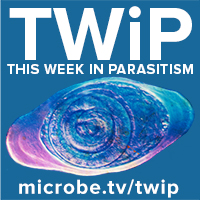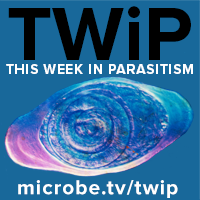TWiP explains how circadian clocks of parasite and vector circadian mediate efficient malaria transmission. Hosts: Vincent Racaniello, Daniel Griffin, and Christina Naula Click arrow to playDownload TWiP #260 (95 MB .mp3, 66 minutes) Subscribe (free): Apple Podcasts,…
Sean Murphy joins TWiP to discuss his career and the work of his laboratory to assess the daily natural history of asymptomatic Plasmodium infections in adults and older children in Katakwi, Uganda.
TWiP solves two cases this week, the Man with Issues after COVID-19, and the Man with Left Arm Weakness, then describe how the malaria parasite evades mosquito immunity by glutaminyl cyclase–mediated posttranslational protein modification.
Dickson, Daniel and Vincent solve the case of the Safari Goer With Watery Diarrhea, and explain how a microsporidian endosymbiont of Anopheles mosquitoes might impair the transmission of malaria.
The TWiP professors solve the case of the Ugandan Child with Splenomegaly, and reveal that mutations in the P. falciparum genome that confer artemisinin resistance interfere with endocytic uptake of hemoglobin.
The podcastellani hosts solve the case of the Sailor With Dysentery, and reveal the first virus discovered in Plasmodium species.
The TWiP Wataalamu solve the case of the One Year Old From Kenya With Moving Skin Lesions, and describe how to make mosquitoes refractory to Plasmodium with engineered symbiotic bacteria.
The paratenic hosts reveal a case of scabies in the Traveling Salesman, and discuss a role for natural antibody in protection from infection with Plasmodium.
TWiP 78: Eau de rodent
- October 29, 2014
- Tagged as: attraction, host, malaria, odors, parasite, parasitism, Plasmodium, rodent, scents
Vincent and Dickson discuss how malaria parasites induce odors in their rodent hosts that attract mosquitoes.
Vincent and Dickson review three novel approaches to antimalarial chemotherapy.






